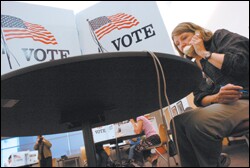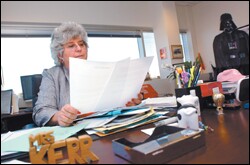The life-size Darth Vader cardboard cutout in Barbara Kerr’s office here is more than a decoration.

Ms. Kerr, the president of the California Teachers Association, sees the gloom-and-doom character from “Star Wars” as an apt representation of her own dark side in this fall’s battle with Gov. Arnold Schwarzenegger over three high-profile education measures he helped put on the Nov. 8 ballot.
“I am pleasant and nice,” said Ms. Kerr, a 58-year-old former kindergarten teacher. “But if you do to me what the governor did to public education, I am going to become the wartime president.”
While the fates of galaxies are not at stake as they are in George Lucas’ mega-movies, the campaign over the California propositions pits a political superstar with sagging approval ratings against the state’s most powerful education group in a no-holds-barred bid for power that could leave the loser badly hobbled.
Earlier this year, Gov. Schwarzenegger called for a special election and then endorsed the three measures that eventually qualified by petition drive for next month’s statewide ballot.
One of the proposals, Proposition 74, would increase the time it takes before a teacher can become a permanent employee from two to five school years.
Another, Proposition 75, would prohibit public-employee unions, such as the CTA, from using a member’s dues or fees for political contributions except with the employee’s annual consent.

On the school finance front, Proposition 76 would allow state policymakers to ignore current constitutionally guaranteed funding levels under certain circumstances.
The Republican governor argues the measures would make it easier to dismiss low-performing teachers, give union members more say over the use of their dues, and put the state on a firmer fiscal footing. Opponents say the measures are unfair to teachers, seek to weaken union activism, and would essentially bankrupt public schools.
Some observers, meanwhile, doubt the potential impact of the proposals, while acknowledging their political significance.
“The initiatives on their face aren’t going to change much at all,” said Mike Antonucci, the director of the Elk Grove, Calif.-based Education Intelligence Agency, a private research and publishing operation that follows the activities of teachers’ unions with a distinctly critical eye. “But they are still extremely important because of the battle of perceptions over who has the upper hand with voters.”
While recent polls indicate voter disfavor with the measures, Gov. Schwarzenegger and his supporters could benefit from a low turnout at the polls in a year when no major state offices are on the ballot.
Political Confrontation
No stranger to political battles, the CTA is putting its clout—and a hefty war chest—on the line to defeat the measures and deal a political roundhouse to the governor.
At a time when labor unions appear to be losing influence across the country, the 335,000-member CTA remains a powerhouse in California, where most Democrats, who dominate the legislature, and some Republicans are unwilling to speak against it.
The CTA, an affiliate of the National Education Association, will spend about $50 million, to be raised through increased dues, to stave off the three proposals backed by the governor and other conservatives.
California voters will be asked on Nov. 8 to decide three major ballot measures dealing with teacher tenure, union fees, and state school aid.
Proposition 74 would increase the length of time before a teacher could become a permanent employee from two to five complete school years.
The measure would apply only to teachers who began the probationary period after the 2003-04 fiscal year.
It would also modify the employee-dismissal process so that two consecutive unsatisfactory performance evaluations could be used for firing employees. School boards would no longer be required to give teachers 90 days to improve, or to provide additional documentation about poor performance.
According to the California legislative analyst’s office, the proposition would have unknown costs on teacher compensation, evaluations, and other activities.
Proposition 75 would prohibit public-employee labor unions from using a member’s dues or fees for political contributions except with prior consent from the employee each year. The restriction would not apply to dues or fees collected for charitable organizations, health insurance, or other purposes directly benefiting the employee. Under the measure, records concerning political contributions by public-employee unions would have to be submitted to the state Fair Political Practices Commission.
Proposition 76 would create a second limit on state spending that would be based on an average of state revenue growth in the three previous fiscal years.
A provision in the measure would change the state’s Proposition 98 school funding formula, adopted in 1988, to make the education budget more subject to annual decisions by state policymakers. The Proposition 98 repayment requirement that any suspended minimum funding levels repaid, would itself be suspended. And if revenues exceeded the proposed spending limit, the excess funds would be divided among the state general fund, schools, tax relief, a budget reserve, construction, and debt repayment.
According to the legislative analyst’s office, the effect on funding for K-14 education, which is covered by Proposition 98 is difficult to predict, but over time the changes would lower the minimum guarantee for schools and community colleges. That does not mean, however, that actual spending on education would decrease.
—Linda Jacobson
The CTA flexed its muscle early in the campaign season by launching extensive ad campaigns and staging protests that have helped deflate the governor’s once-enviable approval ratings by more than 20 percentage points.
Such activism has won Ms. Kerr accolades from other state education groups—including the California School Boards Association, the California PTA, and other education unions that at times have been her opponents in the past.
But even California has never had a governor with quite the aggressive showmanship of Mr. Schwarzenegger, the Hollywood action hero who won the office through a recall of Gov. Gray Davis in 2003.
Gov. Schwarzenegger has repeatedly called the teachers’ unions “special interests” and this month released a video cartoon on his Web site that showed two union thugs hauling a teacher out of her classroom, turning her upside down and shaking money out of her pockets into a pickup truck. But observers say the governor may have underestimated the challenge of mobilizing public opinion behind a set of policy proposals that many Californians see as unnecessary at best.
Political spectators add that, while past California initiatives on school vouchers and a so-called paycheck protection for union members also rallied teachers in opposition, it’s highly unusual for a Golden State governor to attack a former ally on three separate issues simultaneously.
Representatives from education groups say the measures add up to an enormous power grab.
Mainly, Proposition 76 “basically gives the governor complete and utter control over the budget every year, at the expense of public schools,” said Kevin Gordon, the president of School Innovations and Advocacy, a research and lobbying group in Sacramento that represents most of the state’s school districts.
‘No Longer Contributing’
It’s hard to believe now, but last year, the CTA and Gov. Schwarzenegger appeared to be in agreement on school spending.
Shortly after Gov. Schwarzenegger took office in November 2003, he met with the CTA and officials from other education groups who say a deal was brokered behind closed doors to ease the state’s wrenching fiscal problems. That plan, they add, temporarily suspended funding levels guaranteed by the 1988 voter-approved Proposition 98, but stipulated that the money would be replaced when the state economy improved.
The governor shocked the education groups during his State of the State Address this past January when he announced that the $2 billion educators believed they had been promised by the deal was going to go to other state priorities, mainly transportation.
In recent months, Gov. Schwarzenegger has denied that such an agreement ever existed.
He and his allies add that the CTA and other unions are out of touch with their members and have misused money from dues for partisan political purposes.
California Secretary of Education Alan D. Bersin, the governor’s top education adviser, said in a recent interview that the state has reached budget gridlock and won’t be able to recover financially unless a new school finance system is put into place that allows it to avoid repeating past mistakes, such as the deficit in fiscal 2004. That red ink came to more than $35 billion, out of a $100 billion annual budget. K-12 education spending makes up more than 40 percent of the state budget.
Mr. Schwarzenegger knew that the proposed ballot measures would upset many people, but he feels he’s doing the right thing for the state, Mr. Bersin said.
“The governor’s message will be heard and will resonate with people’s sense that government is not working,” he said. “The political system is dominated by people protecting the existing set of arrangements that are no longer contributing to quality in California, and have presented a huge set of issues that have to be confronted and dealt with.”
Mr. Bersin, who was the superintendent of the 140,000-student San Diego school district, often squabbled with the teachers’ union there on a variety of issues and eventually saw his contract shortened by the school board. (“Early Bersin Exit Further Clouds San Diego Plans,” Feb. 9, 2005.)
At least Proposition 74, which would extend the time it takes for a teacher to gain tenure, might appeal to administrators and other educators outside the CTA.
But representatives from several of those groups, including the CSBA, said they resisted encouragement by the governor’s aides to work against the CTA.

“I don’t think Schwarzenegger and his people expected, A, so much money would be raised against them, and B, that the public would be so responsive” to the opponents’ message, said Scott P. Plotkin, the executive director of the California School Boards Association.
He added that his group is opposing the teacher-tenure initiative, saying it would actually make it harder to remove incompetent teachers with tenure from their jobs, and would dissuade many badly needed recruits from entering the field.
The governor’s actions, some say, inadvertently united a diverse and often divided education community.
“He way underestimated the seriousness which we take on the assault on education funding,” Mr. Gordon of School Innovations and Advocacy said.
Bellwether State
Ms. Kerr, the union president, spends most of her time these days traveling throughout the state campaigning against the ballot measures. The CTA has also hosted phone banks at which teachers call potential voters.
On a recent night, about 20 San Francisco-area teachers showed up at a phone bank to make calls and participate in a press conference to express their outrage over the union-thug cartoon.
Supporters of the school funding measure, Proposition 76, recently sent teachers e-mails claiming that the CTA is bankrupt, another move that incensed the union.
Later that week, Ms. Kerr met with the hundreds of local union leaders at a leadership conference for the northwestern part of the state. Ms. Kerr used the occasion to dispute the charges from the pro-Proposition 75 forces that the expensive media campaign against the governor’s proposals threatens to bankrupt her group, even after approving an additional $60 dues increase over the next three years.
“We are in stable financial health,” she told about 400 members at the conference. “We will be frugal with your money, but we are going to fight with everything we can to win.”
Further, the union leaders say they must defeat the initiatives lest such ideas gain momentum for elections in other states, which so far have failed.
“It’s the same kinds of issues we keep hearing about around the country,” said Joann M. Waller, an NEA consultant who is on special assignment to organize members in California. “Whenever these things take hold in California, being the bellwether state that it is, it’s empowering to those who are pushing those ideas.”




